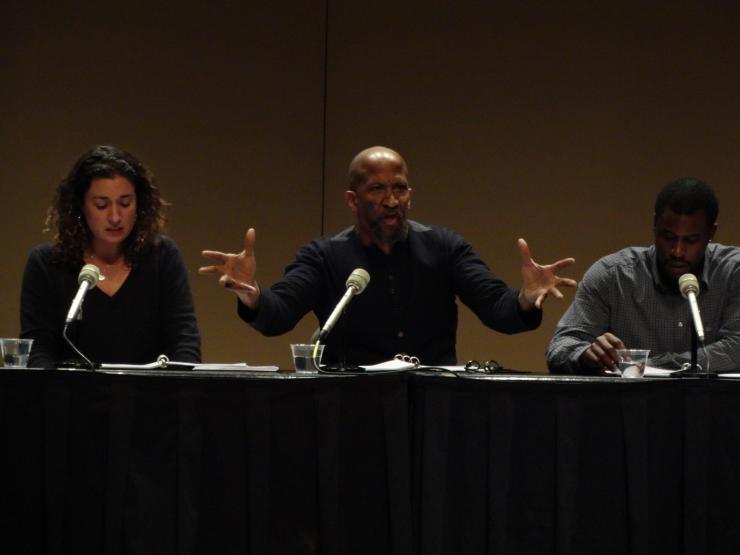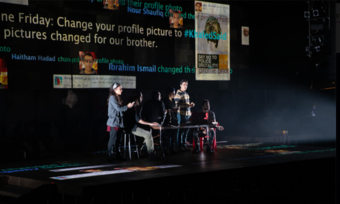Homer’s Trojan War on Boston Stages

In March 2003, organizers in fifty-nine countries launched The Lysistrata Project: A Theatrical Act of Dissent. The event, which included 1,029 readings of Aristophanes’ famed antiwar comedy, was held on the cusp of the US invasion of Iraq, to protest the Bush administration’s plans for unilateral aggression. I was privileged to be a part of one of the many Boston readings organized by Pilgrim Theatre’s Susan Thompson and Kim Mancuso at the Cyclorama, and I still recall the enthusiasm of those involved. The possibility that art could make a difference in the course of worldly events impassioned the many groups who organized the readings; even if our dissent did not ultimately steer the country away from violence, we were sure that we stood on the right side of history, knowing that ours was at least one response to the impending war.
Even still, I should admit here that I do not like Aristophanes’ Lysistrata. Written and performed ca. 411 BCE during the Peloponnesian War, it is about women who hold out on having sex with their husbands in exchange for peace, as if that is all they have to bargain with. Lysistrata is a play that is often relegated to college campuses during times of peace, thanks to the large cast of women. However, on the cusp of war, it often resurfaces in the professional theatre. In 2002, the American Repertory Theatre in Cambridge staged a large production starring Cherry Jones, which in retrospect, became sandwiched between the post 9/11 invasions of Afghanistan in 2001 and Iraq in 2003. If Lysistrata is the woman we go to before war begins to remind us of the horrors that war will bring, then Homer is our go-to man to remind us of the aftermath of war, on society and on our soldiers. In the last four years, Homer’s heroes and victims have been featured on Boston stages, some originating in New York, which reimagine Homer’s Troy including: Trojan Barbie (ART, 2009), Ajax (ART, 2011), Ajax (Theater of War at BU, 2011), These Seven Sicknesses (Suffolk University, 2012), The Penelopiad (BU School of Theatre, 2013), Trojan Women (ArtsEmerson, 2013), and An Iliad (ArtsEmerson, 2013).
Homer’s epic, the Iliad, has become the standard-bearer for the theatre's understanding of war and its aftermath. The playwrights Aeschylus, Sophocles, and Euripides all borrowed and adapted characters from Homer’s epic to engage with the Persian and Peloponnesian wars in their Athenian tragedies. Shakespeare did it in Troilus and Cressida and Marlowe gave a nod to the cause of the war (Helen) in Doctor Faustus with the infamous line, “Was this the face that launched a thousand ships?” It could be argued that every playwright who grapples with representing war on stage writes in the shadow of Homer’s Troy since the intersection of theatre and war begins with that war. Recent scholarship even suggests that the battle in the Iliad itself functions as a kind of performance space, which might be why adaptations are so attractive to playwrights. In her recent book, Homer’s Trojan Theater, Jenny Strauss Clay reminds us of the importance of seeing and frames the field of battle in the Iliad as a kind of performance space for a divine audience. Clay designates the space of war—the battlefield—as a staging area that includes “exits and entrances,” as well as divine audience members for some of the greatest performances ever seen in war by heroes like Hector, Ajax, and Achilles.
In the contemporary theatre, we can find many examples of productions that reimagine and repurpose classical plays already adapted from Homer’s Trojan heroes and victims. Adaptations of classical Greek adaptations of Homer allow for modern voices to speak about contemporary wars on stage while drawing from the archetypes of the hero and the victim in war. To reimagine Homer is to affirm that war is not just a circumstance of history, but ubiquitous to humanity.
To reimagine Homer is to affirm that war is not just a circumstance of history, but ubiquitous to humanity.
Ajax, especially, has been getting a lot of stage time. This tragic suicidal hero has been reborn in the past few years at the same time that the suicide rate of returning soldiers of Iraq and Afghanistan has increased at an alarming rate. In the Iliad, Ajax is compared to an ox and a wall (or shield), while in Shakespeare’s Troilus and Cressida, Ajax is a buffoon who “wears his wit in his belly and his guts in his head.” However, in Sophocles’ version, Ajax becomes an articulate tragic figure who chooses to commit suicide to escape the shame of his behavior against his own army—the only suicide in the extant Athenian tragedies. Ajax, reimagined by both Sarah Benson from Soho Rep at the ART and the NY-based Theater of War in a series of staged readings in Boston, has, in the last few years, become a poster boy for modern-day soldiers with PTSD. Contemporary adaptations of Sophocles’ Ajax reheroize him in order to make meaning out of a soldier’s suicide.
In Benson’s Ajax, the translation by Charles Connaghan emphasized the modern lexicon of war and the production was set in a contemporary “Middle Eastern” locale and framed Ajax as a soldier suffering from PTSD. A prerecorded mediated chorus was used rather than live actors with the exception of the chorus leader played by Remo Airaldi who signified a photo journalist documenting the story in real time. The production also offered an eerie echo with modern American war policy with Colin Powell’s daughter, Linda Powell playing the role of Tecmessa, the mother of Ajax’s son. In the marketing material, this Ajax was described as “the legendary Greek warrior [who] struggles under the weight of psychological and physical injuries, trying to maintain his dignity, identity, and honor.” With the goddess, Athena, playing with Ajax’s mind at the start of the play, Sophocles’ version is not about PTSD, but rather systems of godly justice in the ancient Greek world. However, as a reaction to increased suicide rates among returning veterans, Ajax has been resurrected as a kind of hypermodern hero and a victim of a purposeless war. Furthermore, this modern Ajax brings to light the dualistic role that is required of a soldier archetype, which continues to haunt both returning soldiers and society. In January 2008, the New York Times ran a controversial series of articles claiming that 121 soldiers returning from Iraq and Afghanistan “committed a killing in this country, or were charged with one after their return from war.” This is the problem with the archetype of the soldier who is asked to perform—to kill—in battle and yet takes on an entirely different role when at home.
The Theater of War has been presenting readings of Ajax and Philoctetes to military communities since 2008. The project drew inspiration from Jonathan Shay’s landmark books, Achilles in Vietnam (1995) and Odysseus in America (2002) that interpret the effects of PTSD through the lens of classical Greek heroes from the Trojan War. The goals of Theater of War are such that “by presenting these plays to military audiences, our hope is to de-stigmatize psychological injury and open a safe space for dialogue about the challenges faced by service members, veterans, and their caregivers and families.” The reading of Ajax at BU in 2011 was not performed for a solely military audience, but for the BU community, including some veterans and ROTC. From the beginning of the reading, it seemed important to Bryan Doerries, the artistic director and translator of the play, that the audience know this was the 188th performance and it was also the seventieth anniversary of the attack on Pearl Harbor. Doerries then quickly summarized the Trojan War through to the ninth year of battle and told us: “Here’s all you need to know about scene one,” followed by, “Here’s all you need to know about scene two,” etc. This Ajax was not the entire play, but rather “five scenes” truncated to focus on the trauma of the soldier Ajax and the aftermath of his suicide on his family. This Ajax, played by Reg E. Cathey in theiss reading, has become an allegory for PTSD.
Since Homer praised the gift of storytelling, Ajax’s loss of a voice through his suicide implies a great loss. When Odysseus goes into the underworld in Homer’s Odyssey, he tries to speak to Ajax, who, bitter about the loss of Achilles’ arms to Odysseus, refuses to speak to him and turns away. It is a lingering image; with no voice, and no ability to forgive, Ajax remains forever haunted and silenced by his experiences at Troy. It is only in the theatre, thanks to Sophocles and modern adaptations, that Ajax’s voice has returned to speak for soldiers today. The Theater of War has been able to give voice to those soldiers and their families who must struggle daily with the effects of war. The success of Theater of War can be measured by the fact that in 2009, the Department of Defense provided $3.7 million for the Theater of War to visit fifty military sites.
The Trojan Woman by Euripides was performed around 415 BCE while the Peloponnesian war raged between Athens and Sparta. Thucydides documents the horrors of this war in his History of the Peloponnesian War and we can assume that when Athenians watched this play, Euripides was reminding them of the recent “democratic” vote that had been cast to besiege the island of Melos, kill the men, and sell the women and children as slaves, virtually erasing the island’s identity. While the women are the spoils and victims of the Trojan War, they have also become the archetypes for victims of all wars. As they tell their stories, we cannot imagine how things can get worse, but they do. In the production of Jocelyn Clarke’s Trojan Women (After Euripides) at ArtsEmerson by the SITI Company of New York, we see a standout cast of actresses struggling with a play that is hard to watch. In this production, the chorus of Trojan women was removed, and a sparse set filled with dirt stood in for the remains of a city destroyed by the Greeks. We watch as the women of Troy await their fate and as the familiar “heroes” Agamemnon and Odysseus become recast as villains.
An Iliad also recently at ArtsEmerson, was written by Denis O’Hare and Lisa Peterson and performed by O’Hare. The play poses the question: “Has anything really changed since the Trojan War?” In a riveting moment of theatre, O’Hare as the Rhapsode, or storyteller, answers by cataloging every war in human memory ending with today’s conflict in Syria. From Troy to Syria, it turns out, is not that far when it comes to the history of warfare. An Iliad reminds us that although Homer’s Trojan War comes from an ancient time, it still speaks to the circumstances of war today. Instead of Homer’s famous catalogue of soldiers from Greece, O’Hare cataloged the cities and regions of America where our soldiers come from today. To tell the story of Troy is to tell the story of war. O’Hare said in an interview that when he puts on the coat of the storyteller that he wears on stage, he becomes part of a long tradition of storytellers since Homer who struggled painfully to tell the story of war.
The difficult exercise of reenacting war in the theatre is acknowledged by the Chorus in Shakespeare’s Henry V that recognizes the limits of representing war “within this wooden O.” By the epilogue, the Chorus reminds us that the exercise of playwriting is a far cry from the experience of war, since “with rough and all un-able pen, our bending author hath pursu’d the story, in a little room confining mighty men, mangling by starts the full course of their glory.” We are reminded that the intersection of theatre and war is the stage, and we need good storytellers to mediate the consequences of war, which sadly, seem to go on without end.









Comments
The article is just the start of the conversation—we want to know what you think about this subject, too! HowlRound is a space for knowledge-sharing, and we welcome spirited, thoughtful, and on-topic dialogue. Find our full comments policy here